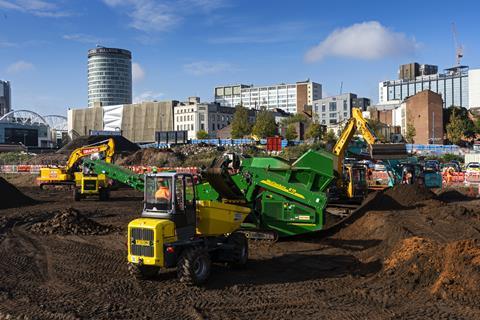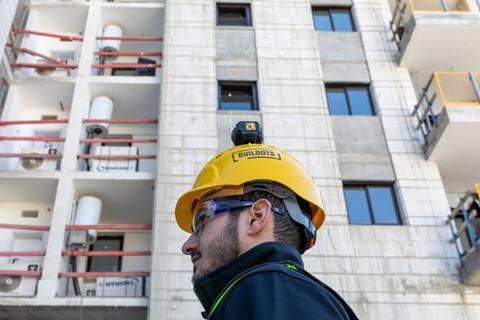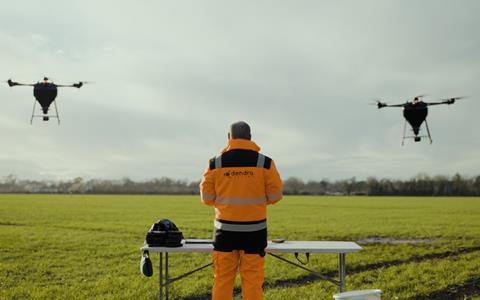As inflation bites, HS2 has been told to find savings to avoid digging further into its contingency funds. Could artificial intelligence be the cost-cutting ace up the projectŌĆÖs sleeve? Daniel Gayne asks senior innovation manager Jonathan Kelly.
Necessity is the mother of invention they say, and right now, HS2 needs to save cash. In response to a recent project update, which showed the high-speed rail scheme digging further into its contingency funds, the Department for Transport has told the schemeŌĆÖs bosses to find savings.
In major civil engineering projects, as in most sectors of construction, calls to cut costs often translate as reductions in scope or quality, but for Jonathan Kelly, senior innovation manager at HS2 Ltd, the need to deliver savings is an incentive to find smarter ways of building.
The HS2 innovation team itself is small (in the single digits), but aims to punch above its weight by helping to develop start-ups through its innovation accelerator, run in partnership with lab space provider Bruntwood SciTech, which is jointly owned by property firm Bruntwood and Legal & General, and government agency Connected Places Catapult.
The accelerator, which recently closed applications for its fifth iteration, develops innovations for four to six months before showcasing them on ŌĆ£demo daysŌĆØ to the HS2 supply chain as well as industry investors.

In many ways, the innovation department acts as a kind of matchmaker, with the top players in a construction industry that, in KellyŌĆÖs words, ŌĆ£isnŌĆÖt known for being on top of the game within AIŌĆØ. He says the accelerator can ŌĆ£break down the barrierŌĆØ for disruptive technology, ŌĆ£making sure they can have an impact with tier ones within our supply chain where they usually wonŌĆÖt get that chanceŌĆØ.
The scheme will result, ideally, in solutions that can help to deliver HS2 more quickly, more safely and for less money. The innovation department claims its work has so far saved more than ┬Ż200m from phase one - but internally, they are understood to be targeting ┬Ż1bn worth of savings.
Kelly says it is ŌĆ£really key for us that, if weŌĆÖre taking someone through the accelerator, they end up on the projectŌĆØ. But that there are some exceptions.
ŌĆ£There are scenarios where it may not be suitable and theyŌĆÖve been chosen because it might be impactful for the wider environment or the wider industry. We see that as a big win for us as well, if they are gaining further investment, they are growing as a company,ŌĆØ he says.
WeŌĆÖre already seeing the benefit in terms of time and cost in terms of how the civils are moving forward in certain areas - we have only just scratched the surface of that benefit
The latest iteration of the accelerator focused on artificial intelligence, seeking five candidates who can use the technology to ŌĆ£help smooth delivery of design changesŌĆØ across HS2ŌĆÖs construction phase. ŌĆ£Cascading design revisions through a live building programme, such as innovations to reduce embedded carbon or alter any detail of its systems, stations or depots is challenging, especially one on HS2ŌĆÖs scale,ŌĆØ said Kelly.
ŌĆ£To help smooth the process, we are looking for innovative tech start-ups with applications to both design and game-plan implementation scenarios that will help strengthen understanding of how the best results can be achieved.ŌĆØ
That is not to say that AI is not already a major part of HS2 - the innovation department currently has 32 AI projects, working with more than 25 SMEs. Machine learning algorithms are already in use processing security camera feeds to monitor health and safety and ensure appropriate personal protective requirements are in use, and AI has also been employed to speed up the pace of groundworks.
Some of the start-ups that have already gone through the accelerator

Buildots
Buildots, which employs around 50 people, was selected from 109 applicants for the first iteration of the innovation accelerator. It has developed wearable camera technology which uses AI and computer vision to automate the tracking of build progress compared with design and schedule, with the aim of reducing and resolving disputes.

Cloudcycle
Cloudcycle has developed tech to optimise the amount of concrete used on construction projects. Using the ŌĆ£internet of thingsŌĆØ principle, the firm fits sensors inside cement mixer drums which learn the properties and qualities of the concrete it is mixing.
The company claims its real-time data management for concrete delivery could save phase one 420,000 tonnes of concrete and cut carbon emissions by 50m kilos. Chief executive Phillip White has said that, without the project, the firm would be ŌĆ£unable to validate our technology or prove the value it bringsŌĆØ.

Dendra Systems
Dendra Systems will use drones and artificial AI to help HS2 to achieve its sustainability goals. The technology firm will support both the planting and monitoring of the 140-mile green corridor of trees planned between the West Midlands and London.
It will learn to identify 46 tree species planted along the route and assess whether they are thriving or in need of help - for instance by improving land conditions or by removing invasive weeds.
ŌĆ£By feeding [ground sensor] data back real time into the design model, through AI and machine learning, you can predict a better model, based on the movements you are seeing. That has been talked about before on projects like Crossrail [ŌĆ”] but this is the first project to ever have implemented that in the UK.
ŌĆØIt is the first project that has been able to look at the data coming in in real time, and change their models and designs quickly to understand: ŌĆśOK, actually we donŌĆÖt need to put in this temporary works because we know the ground has not moved anywhere near as much as we thought it would, so we are safe to proceedŌĆÖ.
ŌĆ£It saves so much cost and weŌĆÖre already seeing the benefit in time and cost in terms of how the civils are moving forward in certain areas - we have only just scratched the surface of that benefit.
ŌĆ£If that technology was there and the supply chain was convinced of that technology from the very start of the project, then we could be saving massive amounts.ŌĆØ
>> See also: Is the future of HS2 at risk?
According to Kelly, the scale and longevity of HS2 makes it a perfect environment for developing innovations, particularly AI-based technology. The multi-phase nature of the project allows tech such as groundworks AI to be tested and developed on phase one, to be deployed properly on the second phase.
ŌĆ£HS2, being the biggest project in Europe, also means we have got the biggest datasets in Europe [which] gives us the opportunity to make the most of AI,ŌĆØ says Kelly, adding that the project has also been able to learn from the failures of Crossrail and HS1 by pulling data from those megaprojects.
What is more, Kelly says the multi-phase aspect of the project is not only beneficial for the start-ups, but also brings new cutting-edge skills and expertise to contractors making them more competitive at home and abroad.
ŌĆ£By us pushing AI, [contractors] are picking it up as a parent company and using it on other projects,ŌĆØ he says. ŌĆ£With a lot of the contractors, this may be the first time theyŌĆÖre using [these innovations].
ŌĆ£But the legacy is that by learning from it they get to use it in other environments, whether it be in the UK or elsewhere [ŌĆ”] Because they are doing it sometimes for the first time here, the knowledge is going to be invaluable for them.ŌĆØ



























No comments yet